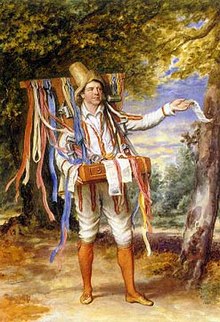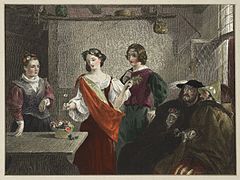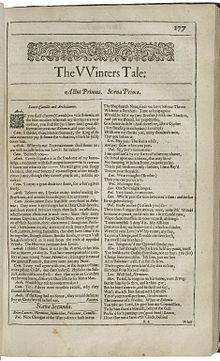Famous Quotes
The Winter's Tale contains Shakespeare's most famous and challenging
stage direction: 'Exit, pursued by a bear'. Here are some more
well-know quotes.

Photo by Sheila Burnett
© RSC
Browse and license our images
I speak as my understanding instructs me and as mine honesty puts it to utterance.
(Archidamus, Act 1 Scene 1)
How say you?
My prisoner? Or my guest? by your dread 'Verily',
One of them you shall be.
(Hermione, Act 1 Scene 2)
What we changed
Was innocence for innocence. We knew not
The doctrine of ill-doing, nor dreamed
That any did.
(Polixenes, Act 1 Scene 2)
Be plainer with me. Let me know my trespass
By its own visage; if I then deny it,
'Tis none of mine.
(Camillo, Act 1 Scene 2)
Is this nothing?
Why then the world and all that’s in’t is nothing:
The covering sky is nothing, Bohemia nothing,
My wife is nothing, nor nothing have these nothings,
If this be nothing.
(Leontes, Act 1 Scene 2)
The silence often of pure innocence
Persuades when speaking fails.
(Paulina, Act 2 Scene 2)
It shall scarce boot me
To say 'Not guilty': mine integrity
Being counted falsehood, shall, as I express it,
Be so received. But thus: if powers divine
Behold our human actions, as they do,
I doubt not then but innocence shall make
False accusation blush and tyranny
Tremble at patience.
(Hermione, Act 3 Scene 2)
Apollo's angry, and the heavens themselves
Do strike at my injustice.
(Leontes, Act 3 Scene 2)
Exit, pursued by a ear.
(Stage direction, Act 3 Scene 3)
Since it is in my power
To o'erthrow law and in one self-born hour
To plant and o'erwhelm custom.
(Time, Act 4 Scene 1)
Ha, ha! What a fool honesty is!
(Autolycus, Act 4 Scene 4)
Though I am not naturally honest, I am so sometimes by chance
(Autolycus, Act 4 Scene 4)
I am ashamed. Does not the stone rebuke me
For being more stone than it?
(Leontes, Act 5 Scene 3)
As the force behind the tragedy stems from Leontes's belief that his wife, Hermione, and best friend, King Polixenes of Bohemia, are lovers, so Leontes has attracted more critical interest than any other character in the play. An Othello who is his own Iago, he is a perfect paranoiac, convinced that he has all the facts and ready to twist any counter-argument to fit his (mistaken) perception of the world. Perhaps because of its uncertain origin, Leontes's madness is a terrifying thing: he becomes a poet of nihilism, demanding, when told that there is "nothing" between Hermione and Polixenes, "Is this nothing? / Why, then the world and all that's in't is nothing, / The covering sky's nothing, Bohemia nothing, / My wife is nothing, nor nothing have these nothings, / If this be nothing"(I.ii.292-296). The roots of his jealousy seem to run too deep for the play to plumb—there are hints of misogyny, of dynastic insecurity, and of an inability to truly separate himself psychologically from Polixenes, but no definitive answers. Indeed, the only answer is his own—in one of Shakespeare's finer images, Leontes says "I have drunk, and seen the spider"(II.i.45).
To balance his morbid, brooding nihilism and sexual jealousy, Shakespeare makes Leontes's daughter Perdita a poet of spring, rebirth, and revitalization, whose own lover (Polixenes's son Florizel) is as constant and generous as Leontes is suspicious and cruel. She appears decked in flowers, and when she dispenses them to everyone around her, the play links her with Proserpina, Roman goddess of the spring and growing things. If Leontes is a tragic hero, then she is a fairy-tale heroine, a princess reared among commoners who falls in love with a prince and—eventually—lives happily ever after. Leontes casts her out as an infant in Act III, when he is in the grip of darkness; in Act V she returns to him, and restores him to happiness. The miracle of Hermione's resurrection at the play's close is only a fitting close to the spirit of rebirth that Perdita brings into the story.






No comments:
Post a Comment